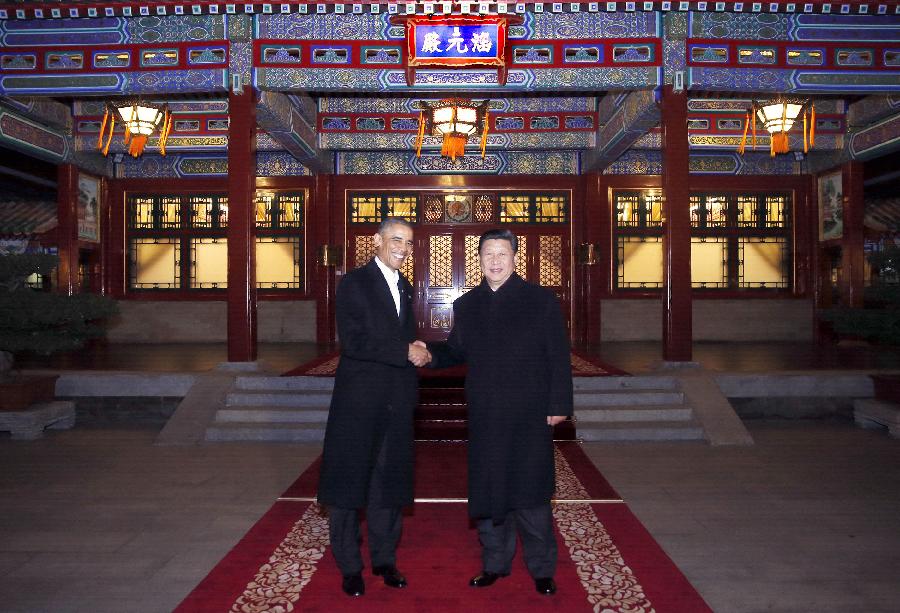 |
| Chinese President Xi Jinping (R) and his U.S. counterpart Barack Obama shake hands at the Zhongnanhai leadership compound in Beijing, capital of China, Nov. 11, 2014. Xi Jinping held a bilateral meeting with visiting U.S. President Barack Obama in Beijing Tuesday evening. (Xinhua/Ju Peng) |
BEIJING, Nov. 11 (Xinhua) -- Chinese President Xi Jinping and his U.S. counterpart Barack Obama on Tuesday pledged to push forward a new type of major-country relations between the two countries.
The two leaders made the pledge in a meeting at the Zhongnanhai leadership compound in central Beijing.
Obama attended the 22nd Asia-Pacific Economic Cooperation Economic Leaders' Meeting and will pay a state visit to China.
Recalling their past meetings, Xi said both sides have maintained close contacts via telephone calls and correspondence.
Xi said he is glad to see that both sides have achieved considerable early harvest on their drive to build a new type of major-country relationship thanks to joint efforts from both sides.
According to Xi, both China and the United States have gained more understanding and are holding higher expectations over the concept of such a relationship.
The U.S. president's visit to China boasts an important opportunity to push forward the relationship, Xi said.
He added that the two leaders should maintain regular and close communications and exchange candid and in-depth views on fundamental issues.
"Only in this way (could the two countries) comprehensively enhance mutual understanding, trust and respect, and steer clear of strategic misjudgments," Xi said.
He called on both countries to expand pragmatic cooperation, with a special focus on actively promoting pathbreaking collaborations.
Communication and coordination on international and regional affairs should also be enhanced, Xi said, in order to jointly contribute to world peace, stability and prosperity.
For his part, Obama noted that the U.S. and China boast the world's two largest economies and two energetic and innovative peoples.
Strengthening cooperation between the two countries, which have seen their interests highly integrated, could benefit people in both countries and the world at large, Obama said.
He said he is willing to exchange views with President Xi on a wide range of issues in a timely manner, and lift the new type of major-country relationship between China and the U.S. to a higher level.
Before the meeting, the two heads of state had a walk at the Zhongnanhai leadership compound in central Beijing.
Xi had dinner with Obama and briefed him on China's efforts in comprehensively deepening reform, advancing rule of law and strengthening the building of the ruling party.
Xi told Obama that "we have found a development path suitable for China's national conditions, which is the socialist path with Chinese characteristics," noting that "we will unswervingly follow it."
The governments of China and the U.S. should properly handle their differences and act as a stabilizer of bilateral relations, Xi said.
Differences between the two countries are unavoidable but they are not the mainstream of the bilateral relationship, Xi said.
China and the U.S. have different national conditions, different history and different cultures as well as different paths of development, said Xi.
He said the two sides should understand and respect each other and live in harmony while keeping their diversities.
To understand China today and predict China in the future, one has to know China's past and culture, said Xi, adding that the "gene of traditional Chinese culture" is deeply planted in the mentality of modern Chinese and the Chinese government's governance strategy.
Chinese people cherish national independence, unity and dignity. The Chinese government must comply with the people's will, firmly safeguard national sovereignty, security and territorial integrity, maintain ethnic unity and social stability and unswervingly pursue the path of peaceful development.
Obama told Xi that the U.S. has no intention of containing China because doing that is not in its own interests.
The U.S. is willing to conduct candid communication and dialogue with China, improve mutual understanding, draw on each other's experience, manage and control disagreements effectively and avoid misunderstanding and misjudgment, Obama said.
China is a partner of cooperation of the U.S., Obama told Xi, while noting that the U.S. supports China's reform and opening-up efforts.
In the times of multipolarization, Obama said, the U.S. side welcomes a constructive role played by China in international issues and is willing to enhance exchanges and cooperation with China, jointly tackle various global challenges and promote peace and security in the Asia-Pacific region and the world.
He said he had very in-depth talks with Xi, which deepened his understanding of the situation in China and the thoughts of the Chinese government and leaders on governance.
He had a better understanding of why the Chinese people cherish the country's unification and stability, Obama said.
After the dinner, the two continued their talks while enjoying the tea.
President Xi again urged the U.S. to jointly shape the new type of major-country relationship.
China and the U.S. share a clear strategic target of building a new type of major-country relationship, he said.
"We should not let the new type of relations stay as a concept or stop at its early harvest. We should push it forward," said Xi.
A good China-U.S. relationship is in the interests of both countries and conducive to the Asia-Pacific and the world, Xi said, adding that leaders of both countries share this strategic understanding.
From a strategic and long-term perspective, China and the U.S. should build their relations step by step, Xi said.
Obama told Xi that the U.S. is ready to work with China to realize this target.
Day|Week|Month